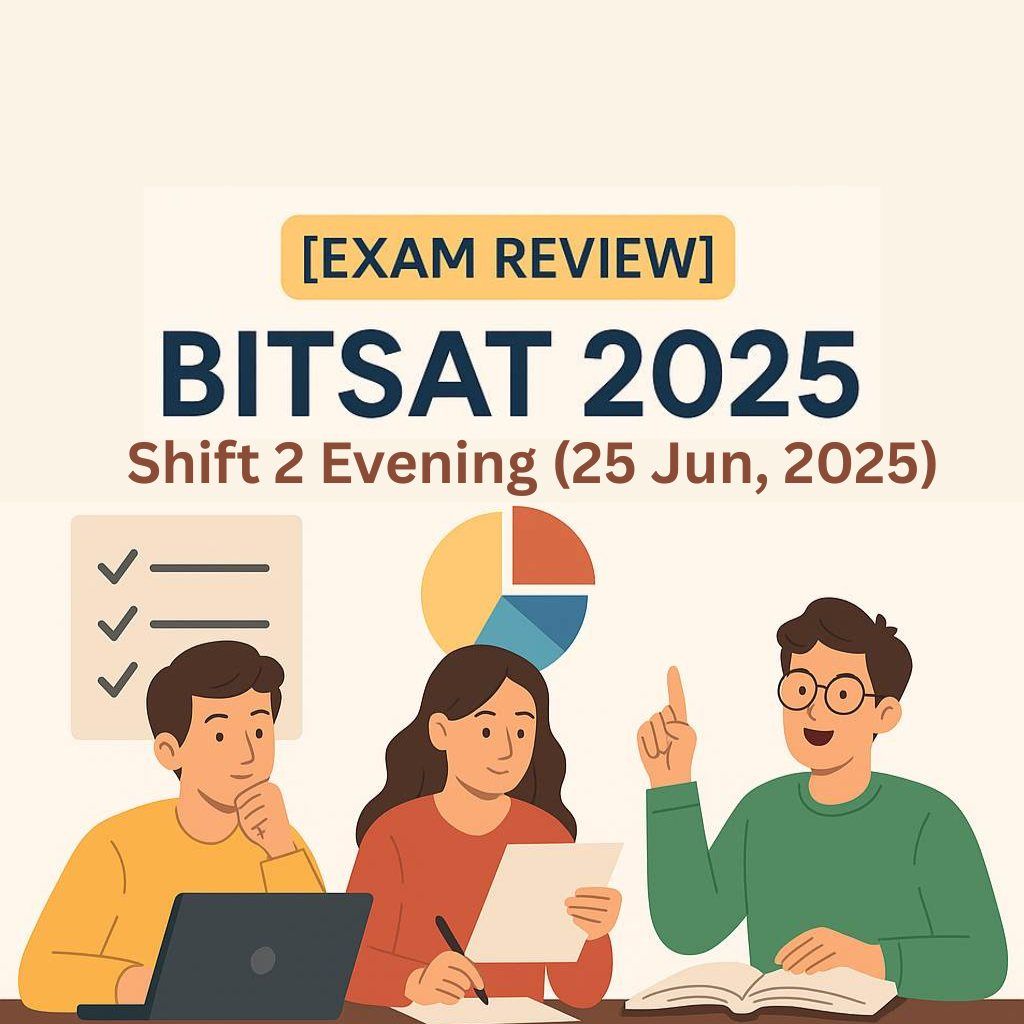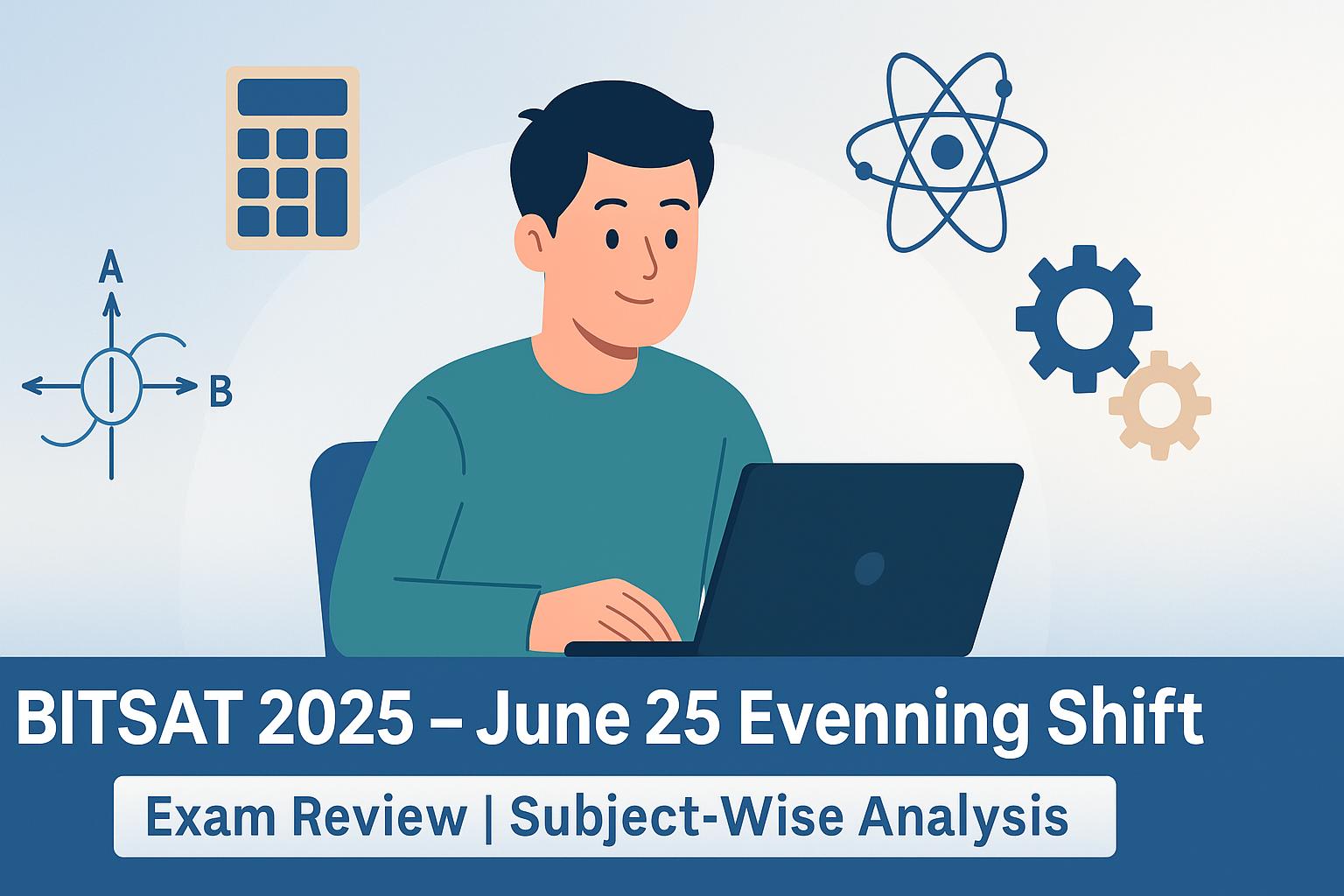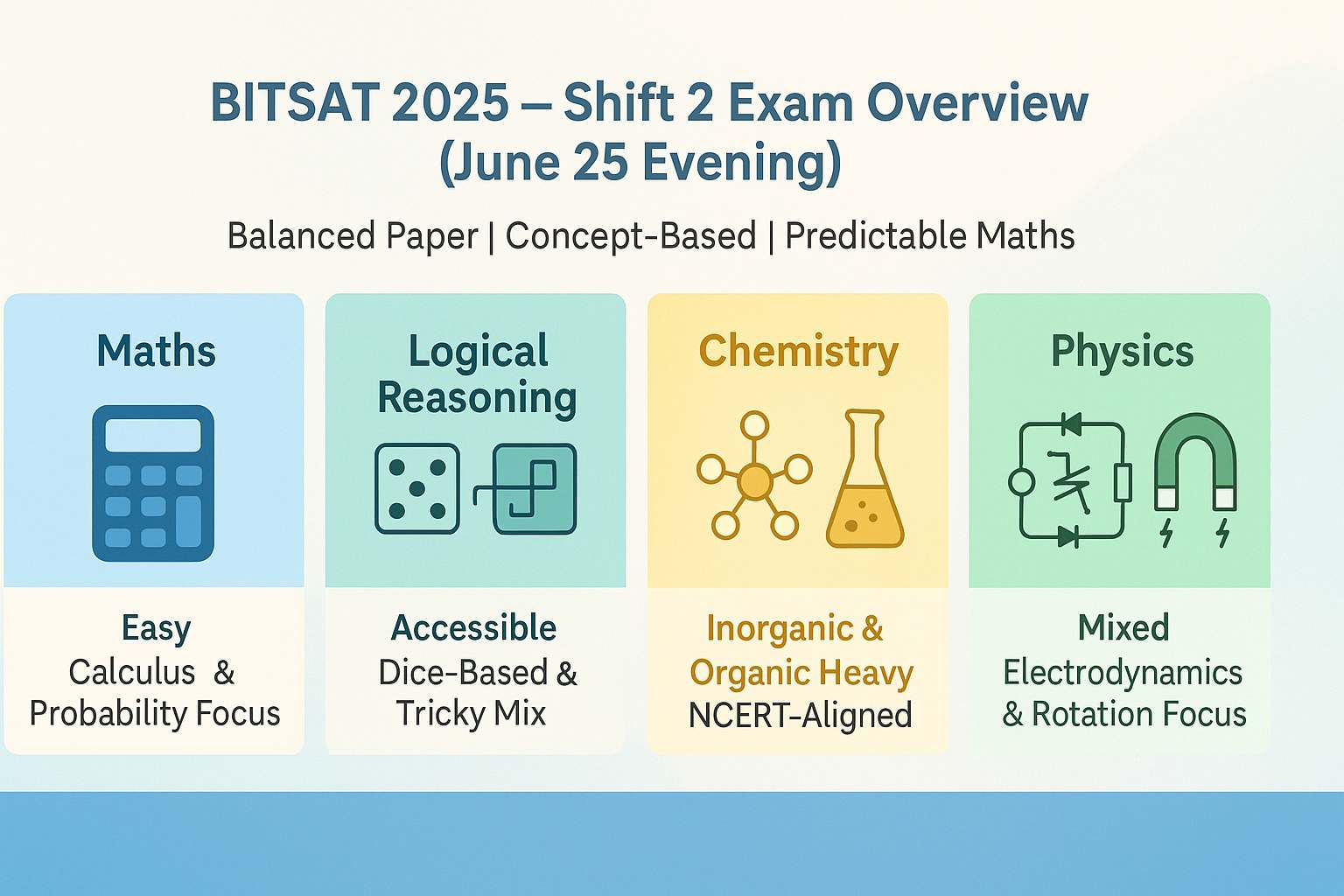Table of Contents
BITSAT 2025 Shift 2 (June 25 Evening): Exam Review, Analysis & Student Feedback
Pratham Jiwnani
6/25/2025

Based on real-time student feedback, here’s your detailed review of Shift 2 of the BITSAT 2025 exam (June 25, Evening). We’ll break down the difficulty level, question types, and subject trends for Maths, Logical Reasoning, Chemistry, and Physics. If you’re prepping for upcoming shifts or future exams, this analysis will give you plenty of valuable insights. No fluff, just straightforward and helpful information!
Exam Overview of Shift 2 June 25 Evening

The exam was well-balanced across all sections, with a mix of easy, straightforward questions and a few challenging ones to test conceptual understanding. Most topics remained within the syllabus, and students found the paper manageable overall. Here's a quick summary:
- Maths: The section was rated as easy, with a focus on calculus (especially differential equations) and standard algebra topics like probability. Integration appeared with basic problem types, and no surprises were reported. Students found this section highly predictable and scoring.
- Logical Reasoning: Logical reasoning was accessible but included a few tricky questions to keep test-takers alert. Dice-based problems were prominent, while clock-based questions were absent. Consistent preparation in foundational topics like dice, series, and patterns was key.
- Chemistry: This section leaned heavily on inorganic and organic chemistry, with a strong emphasis on name reactions, chemical bonding, and coordination chemistry. A single unusual question on ketosis caught students off guard, but the rest of the section stayed aligned with NCERT-level concepts.
- Physics: Physics had a fair mix of easy and tricky questions, with topics like electrodynamics, rotational motion, and modern physics receiving the most attention. Some areas, such as unit & dimensions and NLM, were heavily featured, while topics like waves were less represented.
Key Takeaway for Future Test-Takers:

- Focus on high-yield areas like calculus in Maths, name reactions in Chemistry, and electrodynamics in Physics.
- Stick to the NCERT syllabus for Chemistry, particularly for inorganic and organic chapters.
- Practice logical reasoning basics consistently, as these questions can be tricky but solvable with preparation.
- Overall, a balanced study routine covering standard textbook-level concepts across all sections should help in tackling this exam effectively.
Maths
Overall, students described the Maths section as easy, with straightforward yet conceptually solid questions. There were no surprises or out-of-syllabus questions, staying well within the JEE-level topics most test-takers are familiar with. Here’s how it played out:
- Differential Equations stole the spotlight, with 3–4 questions that were easy to solve.
- Algebra was deemed solvable, focusing primarily on Probability, including 2 probability distribution questions.
- Integration showed up with an easy question like this one:
∫ cosec(θ) * sec(θ) / log(tan(θ))
- Topics like Linear Programming Problems (LPP) made a small appearance, contributing just one question.
- Importantly, no questions emerged from irrelevant chapters like SOT or random non-core topics.
Takeaway for Future Test-Takers
Sharpen your skills in calculus, especially differential equations, as this continues to be a dominant and scoring area. Brush up on probability concepts and expect standard textbook-level algebra questions.
Logical Reasoning
Logical reasoning seemed fairly accessible, even if not entirely straightforward. Out of the 15–16 questions, most were solvable, but tricky ones were scattered in the mix to keep students on their toes.
- Dice-based questions took the lead, with 3 questions specifically focusing on this topic.
- No clock-based problems were reported in this shift.
- One question was reportedly incorrect, though it didn’t cause major confusion.
Takeaway for Future Test-Takers
Get comfortable with common topics like dice, series, and patterns. Logical reasoning thrives on strong basics and practice. Test-takers who remain consistent can easily tackle this section.
Chemistry
If there was a curveball in this shift, it came from the Chemistry section. While generally manageable, it leaned heavily on Inorganic and Organic Chemistry, with just 3–4 questions from Physical Chemistry.
Key topics included:
- Dipole moment
- Salt analysis
- Coordination chemistry
- Chemical bonding
- A mechanism-based question (Organic Chemistry)
- Name reactions, which dominated the Organic section.
- An unusual (and slightly off-topic) question about ketosis, described as "weird" by students.
Takeaway for Future Test-Takers
Don’t skip your NCERT for this section! Coverage was largely textbook-style for inorganic and organic, with a strong emphasis on name reactions, which are a perennial favorite in BITSAT. Weird outliers like “ketosis” might pop up, but these shouldn’t throw you off if you focus on the core syllabus.
Physics
Physics brought a mix of easy and tricky questions, with topics spread fairly evenly, but some areas stood out more than others. Here’s the breakdown:
Must-Know Topics:
- Unit & Dimensions, and Newton’s Laws of Motion (NLM) had strong representation.
- Rotational Motion made an appearance with a direct formula-based question on moment of inertia.
- Modern Physics brought 2 questions on stopping potential, which were consistent with past BITSAT trends.
Dominant Theme:
- Electrodynamics featured heavily, covering almost every critical chapter within the topic, including:
- Electrostatics
- Capacitors
- Alternating Current
- EM waves
- Current Electricity
Notably Absent:
- No major questions came from waves, except a single question picked from Wave Optics.
Takeaway for Future Test-Takers
Focus on high-yield chapters like Electrodynamics and Modern Physics. Revisit Rotational Motion for formula-based questions, and don’t overlook short topics like Wave Optics, which often show up for variety.
Final Notes For This Shift
This shift echoed the hallmark style of BITSAT exams. While not overwhelmingly difficult, the balance of straightforward and tricky questions challenged test-takers to combine speed with accuracy. For aspirants appearing in future shifts, here are some pro tips to ace it:
- Prioritize speed during your practice sessions.
- Chemistry students should lean on NCERT and focus heavily on named reactions.
- Logical Reasoning rewards practice and familiarity with standard topics like dice and patterns.
- Stay confident in calculus and differential equations for Maths.
For those feeling uncertain or just looking to sharpen their prep, make sure to check out additional resources like CrackIT, a test series designed by BITSians, or visit BITS Admission for official information.
Prepare smart, and you’ll do just fine. Good luck with the rest of your BITSAT prep process!